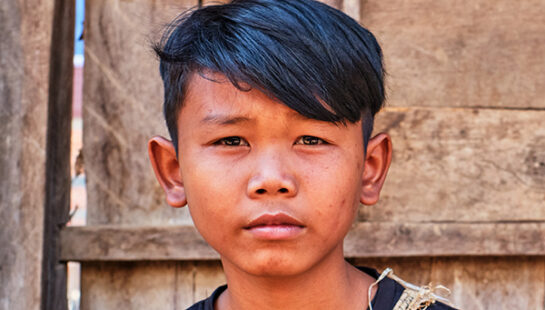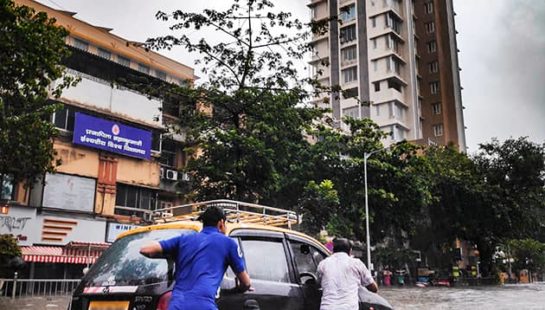No two disasters are ever the same. Some grab the headlines—for example, major earthquakes or cyclones that cause immediate devastation.
But there are many other crises that don’t always make the news: a drought that destroys crops over years, a conflict that forces families to flee their homes, or a landslide that upends a rural community’s way of life.
At Baptist World Aid, we don’t refer to these events as ‘natural disasters’; we often use the term ‘humanitarian crises.’ This small shift in language makes an important difference.
Why Language Matters
The term ‘natural disaster’ is limited to the actual event; it doesn’t take into account the existing vulnerabilities that turn a flood or cyclone into an event that devastates a community. Alternatively, the term ‘humanitarian crisis’ encompasses not just the event, but the breadth of human impact: the loss of life, the disruption to livelihoods, the destruction of homes, the process of recovery. And it recognises how factors like poverty, geography, marginalisation or a lack of support networks can make some people more vulnerable than others when a crisis hits.
The term ‘humanitarian crisis’ encompasses not just the event, but the breadth of human impact.
Understanding the nature of a humanitarian crisis helps shape our response at Baptist World Aid. It determines which Partners we work with, what type of help we provide, what we communicate to our supporters, and whether long-term support is needed.
Here are the different types of humanitarian crises that can occur, and how we respond through our local Christian Partners.
Rapid Onset Crisis
Let’s start with the type of disaster most of us are familiar with. A rapid-onset crisis—think cyclone, earthquake or landslide—unfolds almost instantly and has an immediate physical impact with devastating consequences for communities.
To help people survive, agencies like Baptist World Aid provide help as swiftly as possible, focusing on emergency supplies such as food, clean water, hygiene products and temporary shelter. Our local Christian Partners around the world play an important role here—in a crisis, we draw on those relationships to determine who is best placed to respond. If we don’t already have a Partner on the ground, we turn to networks such as Integral Alliance to help reach the communities who need it most.
Significantly, Baptist World Aid supports low-income countries, where governments and systems may not have the capacity to respond effectively in a crisis. And because we’re a smaller agency, we can respond to disasters that are difficult for a larger global agency to fund, helping communities are impacted by events that are smaller in scale, but no less devastating for families.
Funding can also transition into long-term support, so communities can rebuild their homes, heal from trauma, recover their livelihoods, and keep educating their children.
Slow Onset Crisis
While a rapid onset event occurs without much warning and has a definite start and end point, a slow onset disaster builds over time. It can usually be predicted in advance and unfolds over months or years, such as a drought. Providing aid can give families the ability to adapt, protect the most vulnerable such as children, and prevent worst case scenarios.
A slow onset crisis is currently happening in the Horn of Africa, as the region enters its sixth rainy season with no rain. In Sudan the situation is made worse by conflict and displacement, with 26 million people facing acute hunger (more on crises with multiple causes later). As this disaster evolves, our local Partners are providing support so displaced communities can prevent malnutrition.
Protracted Crisis
A protracted crisis is a disaster that continues for a long period of time—often well after media attention decreases and the initial rush of funding fades.
Many conflicts around the world can be thought of as a protracted crisis. For example, as war in Ukraine enters its fourth year, its impact is more widely felt with loss of livelihoods, lack of infrastructure, displacement and poverty. Providing support is a long-term effort as we stand with people who must deal not only with violence, but the economic impact of the war.
Complex Crisis
A complex crisis doesn’t have one cause, but multiple ones stacked on top of each other, such as a pandemic alongside economic collapse, or an earthquake in a conflict zone.
Most of the disasters funded by Baptist World Aid supporters are considered as complex. A recent example is our Myanmar Humanitarian Response in the wake of a 7.7 magnitude earthquake that killed 3,800 people and injured thousands more.
Myanmar already has around 3.5 million people internally displaced due to military violence. The risks for families in the wake of the earthquake are higher, as they were already vulnerable before the disaster occurred.
Disaster Risk Reduction
Disaster Risk Reduction (DRR) deserves to be mentioned as an important work delivered by our Partners and funded through our supporters.
While we can’t prevent an event from happening, communities can reduce their impact by putting measures and plans in place that improve their preparedness and resilience. This includes conducting emergency training, relocating exposed people and assets away from disaster-prone areas, positioning channels to prevent flooding in homes, and adapting to crops that can withstand drought conditions. Last year Baptist World Aid helped 174 communities develop DRR plans and ran community-level disaster response simulations for 486 people through our local Partners.
Today, we’re seeing crises upon crises unfold globally. The conflation of rising costs, conflict and climate challenges is leading to record levels of displacement, poverty and hunger in many parts of our hurting world. In this context of complex and ongoing crises, your partnership with Baptist World Aid brings clarity, compassion and hope. Thank you for being part of our response to families in times of great need.




 Kelsea Clingeleffer,
Kelsea Clingeleffer,